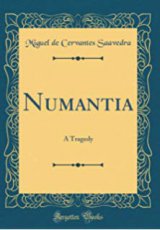The Siege of Numantia Page #3
The Siege of Numantia is a tragedy by Miguel de Cervantes set at the siege of Numantia. The play is divided into four acts. The dialogue is sometimes in tercets and sometimes in redondillas, but for the most part in octaves.
In the Dedication we have ventured to link the name of Gordon with that of Cervantes, and in so doing we feel we do no dishonour to the name of either. Though differing in language and creed, and separated by well-nigh three centuries, they are, nevertheless, kindred souls. In both the Quixotic spirit, in its noblest sense, is clearly displayed. Cervantes was the inventor of Quixotism because it lay deep in his nature. This Quixotism, what is it but the sublime of imprudence? To do what the enthusiasm of the soul prompts and compels; to do it with single-hearted unselfishness; without regard to the adequacy or inadequacy of means; without regard even to eventual success or non-success; but with simple regard to the inspired voice of duty within, come what may: that is Quixotism in supreme degree. Of this sublime imprudence Cervantes and Gordon were equally guilty in their day, and both reaped the reward of it, especially from their country's rulers. It was their joint fate during life to be an enigma to most, a wonder to many, and in death or after death to be beloved by all. It is not for us to say more of the noble man whose name is now a household word amongst us. It is to be hoped when his Diaries are brought to light, and the true story of his sufferings and death is known, that one of our gifted poets may do for the Hero of Khartoum what Cervantes has done for the heroes of Numantia, with a higher harp if not with loftier patriotism. Meanwhile we may be permitted to pay, with all humility, this little tribute to his memory. In conclusion, we have cordially to thank Don Pascual de Gayangos for the interest he has shown in this venture, and for the pains he has taken to elucidate the errors and imperfections of the original text. We have also to thank our dear Amanuensis, whose delicate taste, and skill in languages ancient and modern, have added materially to any worth this little work may have. J. Y. G. SWAYNESTHORPE, LONG DITTON, April, 1885. PERSONS REPRESENTED. ROMANS. SCIPIO, the Roman General. QUINTUS FABIUS, his Brother. JUGURTHA, a Roman Officer. CAIUS MARIUS, a Roman Soldier. Roman Soldiers. NUMANTINES. THEOGENES, Chief Governor of Numantia. CORABINO, } Governors of Numantia. FOUR NUMANTINES, } MORANDRO, } Numantine Soldiers. LEONCIO, } MARQUINO, a Wizard. MILVIO, his Attendant. VIRIATO, } Numantine Youths. SERVIO, } A CORPSE. LYRA, affianced to Morandro. THE BROTHER OF LYRA. Numantine wives, priests with their attendants, two ambassadors, soldiers, children, &c. ALLEGORICAL PERSONAGES. SPAIN, with mural crown. DOURO, with its tributaries. WAR. SICKNESS. HUNGER. FAME. The Scene is laid alternately in the Roman Camp and within the walls of Numantia. NUMANTIA. ACT I. SCENE I. Enter SCIPIO[1] and JUGURTHA.[2] SCIPIO. This hard and heavy task, the brunt of which The Roman Senate gave me to sustain, Hath brought me stress and toil to such a pitch As quite unhinges my o'erburdened brain. A war so long,--in strange events so rich,-- Wherein so many Romans have been slain, Who dares presume to bring it to a close? Who would not tremble to renew its woes? JUGURTHA. Who, Scipio? Who can boast the great success, The untold valour, which in thee abound? The two combined are equal to the stress, Thine arms with glorious triumph shall be crowned. SCIPIO. The strength, inspired by prudent manliness, Will bring the loftiest summits to the ground; While brutal force, moved by a hand insane, Will change to rugged heaps the smoothest plain. 'Tis needful, then, and firstly, to repress The flagrant madness of our soldiery, Who, mindful not of glory and noblesse, In gross consuming lust do sunken lie. My sole desire is this, I wish no less, To raise our men from their debauchery; For if the friend will first amendment show, More quickly then will I subdue the foe. Marius! Enter CAIUS MARIUS.[3] My Lord? SCIPIO. Let notice quick be sent, To all our warriors let the mandate run, That without sloth or hindrance to prevent, They all appear within this place as one; For I would make to them, with grave intent, A brief harangue. CAIUS MARIUS. At once it shall be done. SCIPIO. Go quickly, for 'tis well that all be told Our novel plans, although the means be old. [Exit CAIUS MARIUS. JUGURTHA. Be sure, my Lord, there is no soldier here Who fears not, loves thee not beyond compare; And since thy valour, in its proud career, Extends from Southern seas to Northern Bear, Each man with daring heart, devoid of fear, Soon as he hears the martial trumpet blare, Will, in thy service, rush to deeds of glory, Outstripping far the fabled deeds of story. SCIPIO. Our first concern must be this rampant vice, Which like a canker spreads, to curb and tame; For should it run unfettered, in a trice We bid farewell to good repute and fame. This damage must be cured at any price; For should we fail to quench its blazing flame, Such vice alone would kindle fiercer war Than all the foemen of this land by far. [Behind, they publish the edict, having first beat the drum to assemble. Order of our General: Let the soldiers quartered here Presently in arms appear In the chief square, one and all. And if any man resist This our summons and decree, Let his name, as penalty, Be at once struck off the list. JUGURTHA. No doubt, my Lord, but it is wise and sane To curb thine army with an iron bit, And hold the soldier back with tightened rein When he would plunge into the loathsome pit. Our army's force would be a thing in vain If right and virtue do not go with it; Although it march along in proud array, With thousand squadrons, and with banners gay. [At this point there enter as many soldiers as may be, and CAIUS MARIUS, armed in antique fashion, without arquebuses, and SCIPIO, ascending a small eminence on the stage, glances round at the soldiers and says: SCIPIO. By that proud gesture, by the lusty swell Of these rich trappings, with their martial sheen, My friends, for Romans I do know you well-- Romans in build and gallant port, I mean; But by the tale these soft white fingers tell,
Translation
Translate and read this book in other languages:
Select another language:
- - Select -
- 简体中文 (Chinese - Simplified)
- 繁體中文 (Chinese - Traditional)
- Español (Spanish)
- Esperanto (Esperanto)
- 日本語 (Japanese)
- Português (Portuguese)
- Deutsch (German)
- العربية (Arabic)
- Français (French)
- Русский (Russian)
- ಕನ್ನಡ (Kannada)
- 한국어 (Korean)
- עברית (Hebrew)
- Gaeilge (Irish)
- Українська (Ukrainian)
- اردو (Urdu)
- Magyar (Hungarian)
- मानक हिन्दी (Hindi)
- Indonesia (Indonesian)
- Italiano (Italian)
- தமிழ் (Tamil)
- Türkçe (Turkish)
- తెలుగు (Telugu)
- ภาษาไทย (Thai)
- Tiếng Việt (Vietnamese)
- Čeština (Czech)
- Polski (Polish)
- Bahasa Indonesia (Indonesian)
- Românește (Romanian)
- Nederlands (Dutch)
- Ελληνικά (Greek)
- Latinum (Latin)
- Svenska (Swedish)
- Dansk (Danish)
- Suomi (Finnish)
- فارسی (Persian)
- ייִדיש (Yiddish)
- հայերեն (Armenian)
- Norsk (Norwegian)
- English (English)
Citation
Use the citation below to add this book to your bibliography:
Style:MLAChicagoAPA
"The Siege of Numantia Books." Literature.com. STANDS4 LLC, 2024. Web. 23 Nov. 2024. <https://www.literature.com/book/the_siege_of_numantia_60>.




Discuss this The Siege of Numantia book with the community:
Report Comment
We're doing our best to make sure our content is useful, accurate and safe.
If by any chance you spot an inappropriate comment while navigating through our website please use this form to let us know, and we'll take care of it shortly.
Attachment
You need to be logged in to favorite.
Log In